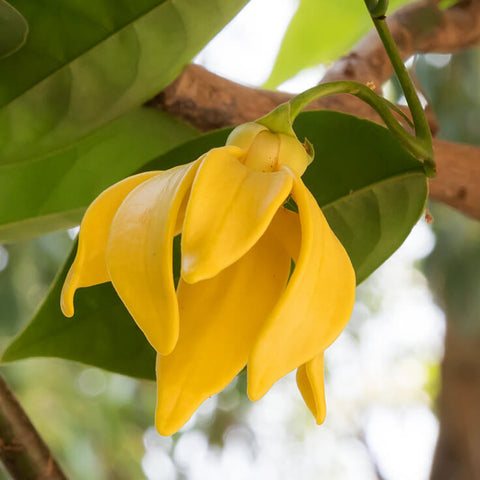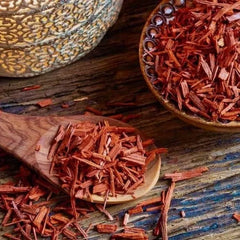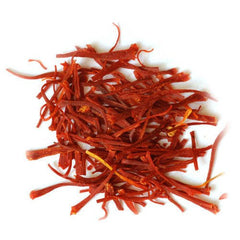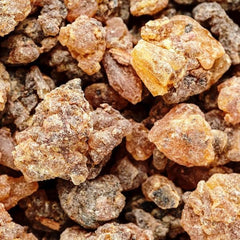What Does Ylang Ylang Smell Like?
As An Amazon Associate We Earn From Qualifying Purchases At No Extra Cost To You

Embark on a fragrant journey to the tropics and discover the alluring aroma of ylang-ylang. Originating from the Cananga tree, primarily found in Southeast Asia, ylang-ylang boasts a rich and exotic scent that captures the essence of lush tropical landscapes. Join us as we explore the question: What does ylang-ylang smell like?
What Does Ylang Ylang Smell Like?
The fragrance of ylang-ylang is a captivating symphony of floral and sweet notes, creating a luxurious and sensual olfactory experience. Imagine the heady scent of blooming flowers mingled with a hint of creamy sweetness. Ylang-ylang's aroma is a celebration of the exotic, offering a lush and intoxicating journey for the senses.
Exotic Floral Bliss: A Garden in Full Bloom
As you encounter ylang-ylang, the initial olfactory impression is akin to strolling through a tropical garden in full bloom. The fragrance is an enchanting blend of rich floral notes, reminiscent of jasmine and neroli, with a unique touch that sets ylang-ylang apart. Picture the petals of exotic flowers opening under the warm tropical sun, releasing their intoxicating aroma into the air.
Sweet Sensuality: A Creamy and Velvety Undertone
The scent of ylang-ylang carries a sweet and creamy undertone, adding a layer of sensuality to its floral profile. This subtle sweetness contributes to the overall richness of the fragrance, creating an inviting and luxurious aura. Ylang-ylang's sweet sensuality makes it a popular choice in perfumery for those seeking a sophisticated and indulgent scent.
Balancing Act: Floral Harmony with a Hint of Spice
Ylang-ylang achieves a delicate balance between floral sweetness and a hint of spice. The fragrance unfolds like a carefully orchestrated dance of notes, with a subtle spiciness that adds depth and complexity. This harmonious blend of floral and spicy elements creates a well-rounded and intriguing olfactory composition.
Velvet Petals: A Silky and Luxurious Texture
Delve deeper into the scent, and you may notice a velvety texture that characterizes ylang-ylang's fragrance. It's as if the aroma caresses the senses with the smoothness of silk, evoking a sense of opulence and luxury. Ylang-ylang's velvety petals contribute to the overall sensorial experience, making it a sought-after note in high-end perfumery.
Ylang Ylang's Tropical Elegance
In essence, ylang-ylang's fragrance is a tropical symphony of exotic floral bliss, sweet sensuality, a balancing act of floral harmony, and the velvetiness of its petals. It stands as a testament to the elegance and richness of this tropical floral gem, offering a sensory experience that is both captivating and indulgent. Ylang-ylang invites us to savor the opulent notes found within its blossoms, a fragrant journey that unfolds with every enchanting whiff.
Factors Influencing the Scent of Ylang Ylang Fragrance Oil
Ylang ylang fragrance oil is a meticulously crafted composition designed to capture the alluring and exotic aroma of the ylang-ylang flower. The formulation of this fragrance involves a thoughtful combination of aromatic compounds. Here are several factors that contribute to the luxurious and sensual scent of ylang ylang fragrance oil:
-
Fragrance Composition: Ylang-ylang fragrance oil is a carefully blended mixture of various aromatic compounds, chosen to replicate the characteristic scent of ylang-ylang. This composition may include both synthetic and natural ingredients to achieve the desired olfactory profile.
-
Floral Essence: At the heart of the fragrance lies the essence of ylang-ylang. Notes of rich floral undertones, reminiscent of the ylang-ylang flower, are intricately blended to mirror the exotic and captivating aroma.
-
Synthetic vs. Natural Components: Ylang-ylang fragrance oil often combines both synthetic and natural ingredients. Perfumers make choices to strike a balance between authenticity, cost considerations, and sustainability in the selection of these components.
-
Extraction Method: The method used to create ylang-ylang fragrance oil, whether through distillation or extraction, plays a crucial role in defining the aromatic profile. Specific extraction methods contribute to the faithful recreation of the fresh and exotic scent.
-
Additional Floral and Sweet Notes in the Blend: The fragrance may incorporate additional floral elements or subtle sweet notes to enhance complexity. These complementary notes contribute to the overall richness of the scent, capturing the essence of ylang-ylang.
-
Quality of Ingredients: The quality of raw materials, including the source of essential components, directly influences the opulence and authenticity of the ylang-ylang scent in the fragrance oil.
-
Perfumer's Artistry: The expertise and creativity of the perfumer or fragrance creator are crucial. Perfumers leverage their skills to balance different components, creating a distinctive and indulgent ylang-ylang fragrance.
-
Regulatory Compliance: Adherence to regulatory standards and restrictions on certain fragrance ingredients is crucial. Compliance with safety guidelines requires careful consideration of ingredient choices to ensure the fragrance is safe for use.
-
Usage in Products: Ylang-ylang fragrance oil can be incorporated into various products, including perfumes, candles, room sprays, and bath products. The interaction with other ingredients in specific product formulations can influence how the ylang-ylang scent is perceived.
-
Product Type and Concentration: The concentration of ylang-ylang fragrance oil in a product affects the strength and longevity of the scent. Higher concentrations may be suitable for perfumes, while lower concentrations work well for candles, soaps, or room sprays.
-
Storage Conditions: Proper storage conditions for ylang-ylang fragrance oil, both before and after formulation, are essential to maintain its stability and scent. Storing it in a cool, dark environment helps preserve the freshness of the fragrance.
-
Consumer Preferences and Trends: Formulations of ylang-ylang fragrance may adapt to changing consumer preferences and market trends. The popularity of floral scents or unique blends may influence product formulations.
-
Artisanal vs. Commercial Production: Differences between artisanal and commercial production of ylang-ylang fragrance oil may impact ingredient sourcing, formulation, and overall quality. Artisanal methods may emphasize craftsmanship and unique blends.
-
Post-Formulation Processing: Additional processes, such as aging or filtering after the formulation of the fragrance oil, may influence the final scent and contribute to the desired characteristics.
Exploring different formulations of ylang-ylang fragrance oil allows consumers to experience a range of luxurious and sensual scents reminiscent of the enchanting ylang-ylang flower. Individual preferences play a significant role in selecting the perfect ylang-ylang fragrance for various applications.
What to Look for When Choosing Ylang Ylang Fragrance Oil
Selecting a ylang-ylang fragrance oil allows you to indulge in the exotic and sensual aroma of ylang-ylang. Whether used in perfumes, candles, diffusers, or personal care products, consider these factors to ensure you choose a high-quality and authentic ylang-ylang fragrance oil:
-
Floral Authenticity: Seek a ylang-ylang fragrance oil that authentically captures the rich, floral, and exotic scent of real ylang-ylang. Look for a fragrance that embodies the unique floral notes characteristic of quality ylang-ylang.
-
Natural vs. Synthetic: Determine whether the fragrance oil is derived from natural sources or is synthetically produced. Natural ylang-ylang oils can provide a more nuanced and realistic scent, closely resembling the aroma of actual ylang-ylang blossoms.
-
Blend Ingredients: Check the blend of ingredients in the fragrance oil. A well-crafted combination of natural and synthetic components can contribute to a balanced and long-lasting ylang-ylang fragrance.
-
Intensity Level: Consider the intensity level of the ylang-ylang fragrance. Some may prefer a subtle and sensual scent, while others may desire a more pronounced and luxurious aroma. Look for a fragrance that aligns with your desired level of intensity.
-
Versatility: Choose a fragrance oil that is versatile and suitable for various applications. Whether used in perfumes, candles, lotions, or diffusers, versatility allows you to enjoy the exotic scent in different settings.
-
Packaging: Assess the packaging of the fragrance oil. Opt for a bottle that is dark or opaque to protect the oil from light exposure, preserving its freshness and preventing deterioration over time.
-
No Residue or Discoloration: Ensure that the ylang-ylang fragrance oil leaves no residue or discoloration when incorporated into different products. A high-quality oil should seamlessly integrate into various mediums without causing unwanted effects.
-
Manufacturer Reputation: Research the reputation of the manufacturer or brand. Choose well-established brands with positive reviews, as they are more likely to produce reliable and high-quality fragrance oils.
-
Testing Options: Look for fragrance oils that offer testing options or sample sizes. This allows you to experience the scent firsthand before committing to a larger quantity, ensuring it aligns with your preferences.
-
Ethical and Sustainable Practices: Consider the manufacturer's commitment to ethical and sustainable practices. Brands that prioritize responsible sourcing and environmentally friendly production contribute to a more conscientious choice.
By considering these factors, you'll be better equipped to choose a ylang-ylang fragrance oil that not only aligns with your preferences but also ensures a high-quality and indulgent olfactory experience in your chosen applications.
Where to Find Reputable Ylang Ylang Fragrance Oils
Indulging in the luxurious aroma of ylang-ylang is a delightful experience, and finding reputable fragrance oils enhances that journey. Here are some places where you can find high-quality ylang-ylang fragrance oils:
-
Specialty Candle and Soap Supply Stores: Explore specialty stores dedicated to candle-making and soap supplies. These stores often carry a variety of fragrance oils, including unique scents like ylang-ylang, suitable for crafting candles, soaps, and other scented products.
-
Online Fragrance Oil Retailers: Browse reputable online platforms specializing in fragrance oils. Websites and retailers dedicated to aromatherapy, candle making, or DIY crafting may have an extensive selection of ylang-ylang fragrance oils. Check product descriptions and customer reviews for authenticity and quality.
-
Artisanal or Handmade Markets: Attend artisanal markets or craft fairs where independent sellers showcase handmade products. Artisan vendors may create unique and carefully crafted ylang-ylang fragrance oils, providing an opportunity to explore distinct options.
-
Local Essential Oil or Perfume Shops: Specialty shops focusing on essential oils or perfumes may carry ylang-ylang fragrance oils. These stores often prioritize high-quality scents and may offer a range of unique and exotic aromas.
-
Online Marketplaces: Platforms like Etsy or other online marketplaces featuring handmade or artisanal products can be sources for ylang-ylang fragrance oils. Look for sellers with positive reviews and detailed information about their products.
-
Aromatherapy Stores: Aromatherapy stores often carry a variety of fragrance oils for different applications. Inquire about the availability of ylang-ylang scents to add a luxurious and exotic aroma to your living space.
-
Local Farmers' Markets or Herbal Shops: Check with local farmers' markets or herbal shops that specialize in natural products. Some of these establishments may offer fragrance oils with botanical scents, including ylang-ylang.
-
Specialty Perfume Retailers: Explore specialty perfume shops that focus on unique and exotic fragrances. These stores may carry ylang-ylang fragrance oils known for their distinctive and luxurious floral notes.
-
Word of Mouth: Seek recommendations from friends, family, or members of fragrance communities for trusted sources of ylang-ylang fragrance oils. Personal experiences and suggestions can guide you to reputable suppliers known for quality and authenticity.
-
Check Ingredients and Descriptions: Before making a purchase, carefully read product descriptions and check ingredient lists for ylang-ylang fragrance oils. Authentic and reputable sellers provide clear information about the composition and intended use of their products.
Note: Ylang-ylang fragrance oils can bring a luxurious and exotic note to your DIY projects. Ensure that the fragrance oil you choose aligns with your intended use, whether it's for perfumes, candles, diffusers, or other creative endeavors. Follow safety guidelines provided by the manufacturer for proper usage.
20 Questions and Answers about Ylang Ylang:
-
What is ylang ylang? Ylang ylang (Cananga odorata) is a tropical tree native to Southeast Asia, known for its fragrant flowers.
-
How is ylang ylang used in perfumery? Ylang ylang essential oil, extracted from the flowers, is a popular ingredient in perfumery, valued for its sweet, floral, and exotic aroma.
-
What does ylang ylang smell like? Ylang ylang has a rich, sweet, and floral fragrance with hints of jasmine and neroli. It is often described as exotic and sensual.
-
What are the different grades of ylang ylang oil? Ylang ylang essential oil is typically graded based on its distillation stages: Extra, I, II, and III. Extra is the most expensive and has the most intense aroma.
-
How is ylang ylang oil extracted? Ylang ylang oil is obtained through steam distillation of the freshly picked flowers. The distillation process may yield different grades of oil.
-
What other scents complement ylang ylang in perfumes? Ylang ylang blends well with floral notes like jasmine and rose, as well as with citrus oils such as bergamot and neroli. It is often used in oriental and exotic fragrances.
-
Is ylang ylang used in men's or women's fragrances? Ylang ylang is versatile and can be found in both men's and women's fragrances. Its sweet and floral notes add depth and complexity to various scent profiles.
-
What are the cultural associations of ylang ylang? Ylang ylang is associated with romance and is often used in traditional wedding ceremonies in various cultures. It is also believed to have mood-enhancing properties.
-
Does ylang ylang have any therapeutic benefits? Ylang ylang is believed to have various therapeutic properties, including its potential to reduce stress, promote relaxation, and act as an aphrodisiac.
-
Can ylang ylang be overpowering in a perfume? While ylang ylang has a potent fragrance, its intensity can be adjusted based on the grade of oil used in a perfume blend. It is often used in moderation to avoid overpowering other notes.
-
Does the origin of ylang ylang affect its scent? The geographical origin of ylang ylang can influence the aroma. For example, flowers grown in different regions may have subtle variations in fragrance.
-
Can ylang ylang be used as a standalone fragrance? Yes, ylang ylang is sometimes used as a standalone fragrance, especially in natural perfumery. Its complex scent profile makes it appealing on its own.
-
Is ylang ylang oil sensitive to light and heat? Ylang ylang oil is sensitive to light and heat, and it should be stored in dark, cool conditions to preserve its aromatic properties.
-
What are some famous perfumes containing ylang ylang? Chanel No. 5 and Joy by Jean Patou are two iconic perfumes that feature ylang ylang as one of the key ingredients.
-
Is ylang ylang sustainable in perfumery? Sustainable practices are essential in ylang ylang cultivation to ensure the longevity of the plant species and protect the ecosystems where it grows.
-
Can ylang ylang oil change over time? Ylang ylang oil may undergo changes in fragrance over time, and its aroma can mature and develop additional nuances during the aging process.
-
Are there any precautions when using ylang ylang oil on the skin? Ylang ylang oil should be used in moderation on the skin, as excessive use may cause sensitization. It is advisable to perform a patch test before widespread application.
-
Does ylang ylang have any symbolic meanings? Ylang ylang is often associated with love, harmony, and relaxation. In some cultures, it symbolizes happiness and is used in rituals and ceremonies.
-
Can ylang ylang be blended with non-floral notes? Yes, ylang ylang can be blended with a variety of non-floral notes, such as woody, spicy, or oriental accords, to create complex and well-balanced fragrances.
-
Is ylang ylang used in other beauty and skincare products? Yes, ylang ylang is a popular ingredient in various beauty and skincare products, including soaps, lotions, and hair care items, due to its pleasing fragrance and potential skincare benefits.
Buy Perfumes - Best Online Retailers
Click For Affordable Inspired Perfume Alternatives
Click For The Best Niche Perfumes & Decants
Pheromone Perfumes - Confidence, Attraction & Appeal - Click For More
Home Fragrances & Candle Warmers - Click To Scent Up Your Spaces Today!



